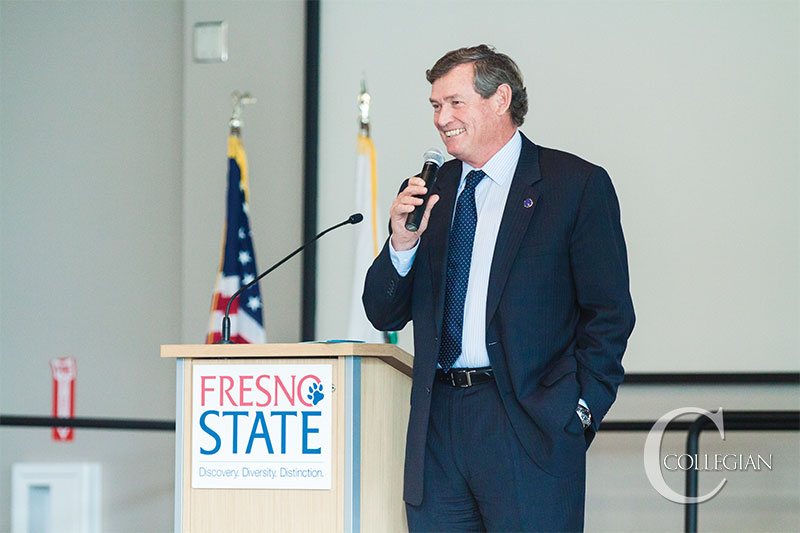
It was an eventful “homecoming” for California State University Chancellor and Fresno state alumnus Timothy White Wednesday. He pardoned a turkey, met a camel and fielded questions during an open campus forum about the CSU system and pay raises for staff and faculty.
It was stop #21 on White’s tour of the CSU campuses and his first official visit to his alma mater since becoming chancellor last December. White said during the forum that touring the campus brought back a lot of memories.
White got his bachelor’s degree in 1970 and was on the water polo team as well.
At the start of the forum in North Gym 118, he pointed just in front of the stage.
“This is where a goal used to be,” White said.
He then pointed to the rafters above and hinted at dangerous jumps into the water from the high perch.
“Of course, you can’t do that anymore with the concrete.”
The trip also created new memories. White pardoned a 17-week-old turkey named Pepper from the fate of being a Thanksgiving meal after it “proved” it was a Bulldog fan.
White said that if the turkey lay down, it would be pardoned, which it did with a little help from its handler.
Later that night during Smittcamp Alumni House’s monthly Hump Day Hangout, he met Tia the camel.
During the forum, which about 100 people attended, a different bump was the center of attention””a bump in pay.
Lisa Weston, English department chair and faculty union chapter president, said to White that faculty have shouldered a greater burden over the past few years without a corresponding increases in benefits or pay.
Weston said compensation for faculty is at least 15 percent below the market value.
In response, White agreed with the fundamental point that there has not been a significant pay raise in years. However, he said faculty at CSU campuses are not alone.
“We’ve gone through a dramatic recession, and political decisions were made about where the money went,” White said.
He said a 33 percent budget cut in state funding since 2008 meant that tough decisions had to be made, like increasing tuition and foregoing pay raises for all CSU staff.
“It doesn’t make it right, but that’s a lot of money,” he said. “People haven’t got raises, and they are working longer and harder.”
He said there was a clear signal from the Legislature to him to focus on students and not to spend money on faculty raises.
“How could I ask our good people to say, ‘Look, double down your effort, do more, have bigger classes, fewer people working,’ all of these issues and say, ‘We’ll get around to compensation some other time.’ That was a nonstarter to me.”
Since that sharp decline in funding, the gap has been closed to within about $325 million of the old number.
“It’s getting better, but it is still going to hurt,” White said.
Faculty received a 1.3 percent raise this year, and there could be a 3 percent salary increase as part of the CSU trustees’ budget proposal to lawmakers this year, he said.
White said that even if pay increases happen, though, the workload facing CSU faculty isn’t going to change overnight.
“We have to think about using technology when it is appropriate [to help faculty],” White said. “We have to make hard decisions about how many students we let in.”




